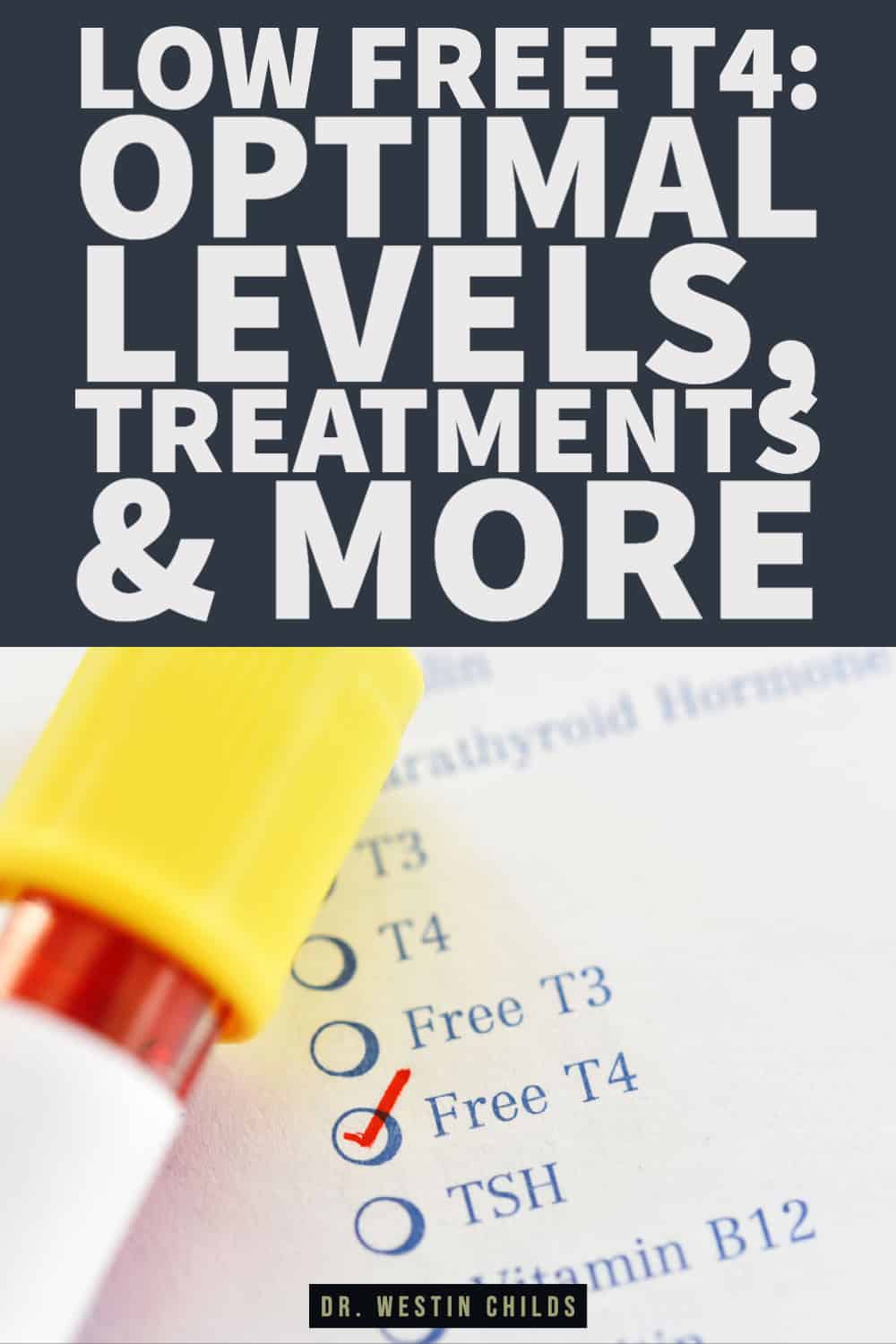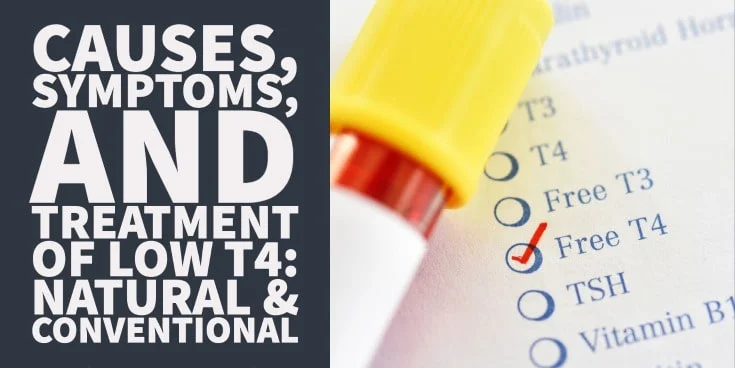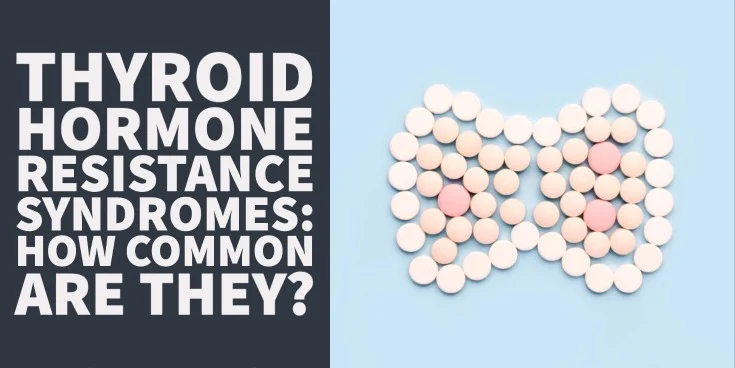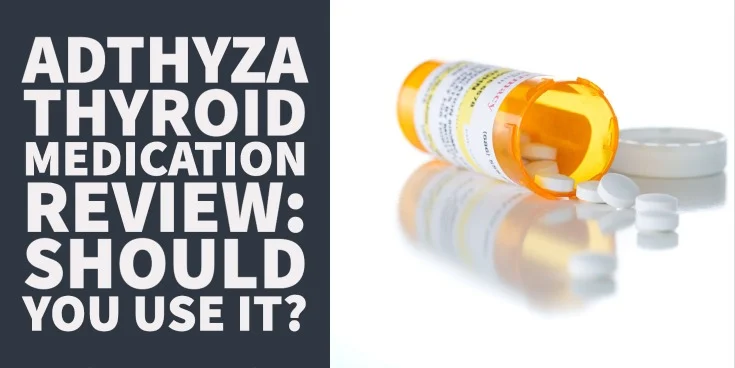Have you been diagnosed with low T4 through lab testing?
Are you also experiencing symptoms such as fatigue, weight gain, depression, or hair loss?
If so, then you may be suffering from low T4 or hypothyroidism.
This post will teach you what you need to know about T4 testing including the symptoms associated with low T4, what causes this condition, and how to treat it:
What Does your T4 Level Mean?
What does T4 actually measure in your body?
T4 is a blood test that gives you insight as to how well your thyroid is functioning.
In order to understand how this all works, you need to know some basic physiology.
Under normal circumstances, your body should produce two very important thyroid hormones: Thyroxine and Triiodothyronine.
T4, also known as thyroxine, is the most abundant thyroid hormone that your thyroid gland produces.
Both of these hormones are produced in response to another hormone known as TSH or Thyroid Stimulating Hormone.
In this way, your TSH helps directly influence how much T4 your thyroid gland is producing.
The connection between TSH and your T4 gives valuable insight into how well your thyroid gland is functioning and these two hormones should ALWAYS be tested together (more on that below).
But understanding what T4 is doesn’t necessarily give you information on why it is important.
So what does T4 actually do in the body?
T4 as a thyroid hormone is not as biologically active as T3 (1), but it does play a very important role in regulating how much T3 your body is able to produce.
And this is perhaps the most important function that T4 plays.
It acts as a reservoir for T3 production that your body can draw upon as necessary.
What this means is that low T4 will usually lead to low circulating levels of T3 or low levels of cellular T4 conversion which ultimately leads to the symptoms of hypothyroidism (which is probably the reason you are not feeling well).
You can think of this analogy to help make sense of how this works:
Consider a dam and how it works.
Water is backed up behind the dam and slowly lets through over time, but there is always a large reserve of water behind the dam to draw upon if necessary.
In this analogy the water behind the dam is T4, the dam itself is the conversion process of T4 to T3 and the water that comes through is the T3 itself.
In the end, you HAVE to get the T3 and your body uses the dam (in this case specific enzymes) to take water behind the dam (T4) and let it pass through (as T3).
This mechanism is set in place to allow your body ultra-fine titration of thyroid hormone as it sees fit.
DOWNLOAD FREE RESOURCES
Foods to Avoid if you Have Thyroid Problems:
I’ve found that these 10 foods cause the most problems for thyroid patients. Learn which foods you should avoid if you have thyroid disease of any type.
The Complete List of Thyroid Lab tests:
The list includes optimal ranges, normal ranges, and the complete list of tests you need to diagnose and manage thyroid disease correctly!
Symptoms of Low T4
Low T4, while easily diagnosed with lab testing, is often associated with very specific symptoms.
These symptoms tend to bring patients to their doctor as they tend to feel very run down.
The symptoms associated with Low T4 are quite expansive, but I’ve included a list below that you can draw from.
Symptoms associated with Low T4:
- Hair loss or other changes to your hair texture/quality
- Fatigue or feeling run down
- Weight gain (usually mild)
- Dry skin
- Constipation
- Depression or other changes to your mood
- Changes to your menstrual cycle
- Infertility
Why do patients with low T4 experience these symptoms?
It has to do with the analogy we discussed above!
T4 is required for the creation of T3.
States which cause low T4 will almost always result in a condition known as hypothyroidism (a state associated with low thyroid hormone production).
You’ll probably notice that the symptoms listed above are all very closely aligned with hypothyroidism.
What’s interesting is that some patients may experience a low T4, but have a normal TSH.
Hypothyroidism is predominately diagnosed via TSH testing (which isn’t the best idea), so many physicians will consider your thyroid as “normal” even though you have low T4 and the symptoms associated with hypothyroidism.
So how does this happen?
Well, consider that all medical conditions exist on a spectrum.
Before your body develops overt hypothyroidism it will have to develop sub-clinical hypothyroidism and before that, it will develop low T4 and so on.
In this way, low T4 can be an EARLY warning sign of hypothyroidism and may also be a warning of other conditions that may be reversible (2).
4 Causes of Low T4
There are 2 main ways that your body can develop low T4.
#1. Your thyroid gland simply can’t produce thyroid hormone (T4 & T3) due to damage, removal of the gland or some other problem.
#2. Your thyroid gland is not getting signals from the brain to produce thyroid hormone even though it is technically capable of producing thyroid hormone.
Almost all conditions that alter T4 can fit into one of these two conditions.
#1. Hypothyroidism
Hypothyroidism is the name given to the condition which results in low thyroid hormone which can be caused by issues with your brain (not common) or with your thyroid gland itself (much more common).
Obviously, hypothyroidism, because it is associated with LOW thyroid hormone, is one of the main conditions that cause low T4.
Knowing you have hypothyroidism doesn’t necessarily give you a lot of information, though, because it’s more important to understand what is CAUSING it and then try to treat that problem.
One of the most common causes of hypothyroidism is the autoimmune disease known as Hashimoto’s thyroiditis (3) (discussed below).
#2. Thyroiditis (Hashimoto’s thyroiditis)
Hashimoto’s thyroiditis is a condition which causes hypothyroidism but it is the result of direct damage to the thyroid gland itself.
If your thyroid gland is destroyed then obviously it will not be able to produce thyroid hormone (T4 & T3) which will lead to low T4 over time.
This condition is VERY common and is speculated to be the #1 most common cause of hypothyroidism in the United States.
If you have hypothyroidism, and you don’t know why then you should get your antibody levels checked to see if this is the cause in your body.
Hashimoto’s is also notorious for causing hypothyroid symptoms even though lab tests can remain somewhat “normal” for a long period of time.
The damage to your thyroid gland is accomplished slowly over years and years.
This slow, but eventual, destruction of the thyroid gland allows your body to try and “adapt” to these low thyroid levels which may explain why serum thyroid levels remain preserved for so long.
Despite this, it’s often recommended to treat patients who have low T4 but a normal TSH if they also have Hashimoto’s.
This approach results in an improvement in quality of life and a reduction in symptoms.
There are also other causes of Thyroiditis which you can read about here, but they are not as common as Hashimoto’s thyroiditis.
#3. Nutrient Deficiencies
There are at least 13 different nutrients that are required in optimal amounts in order to produce thyroid hormone from your thyroid gland.
Among the most important include Iodine, Tyrosine, Selenium, and Iron.
A deficiency, even a minor one, may negatively impact your body’s ability to produce thyroid hormone.
You can think of these nutrients as the “building blocks” required to make thyroid hormones.
If you run out of these building blocks then your body will be unable to create these hormones, even if your brain and TSH are telling it to make them.
You can’t squeeze water out of a rock no matter how hard you try!
Nutrient deficiencies tend to cause a similar effect in the body.
What’s interesting is that many people may be deficient in these nutrients without even realizing it.

Likewise, iron deficiency is fairly common among women due to menstrual issues and absorption issues in the GI tract.
These nutrients can easily be replaced with other the counter supplements.
Testing and treating iron deficiency is slightly more tricky, but you can read more about how to do that here.
If you don’t think your thyroid-producing nutrients are up to snuff then you can use a supplement like this one which supplies your body with all of the necessary nutrients in optimal amounts.
#4. T3 Supplementation (From Medication)
Another less common cause of low T4 has to do with the direct effects of using T3 containing thyroid medication.
Medications such as Cytomel or liothyronine, when taken for hypothyroidism, will cause a direct reduction in circulating T4 in the body.
This occurs because of how T4 alters thyroid function in the body.
Remember:
T4 acts as the reservoir for T4 to T3 conversion in the body under normal circumstances.
By providing your body directly with T3 you are cutting T4 out of the loop and you no longer need to draw from the reservoir system.
T3 supplementation will almost always cause a reduction in T4 (Low T4), an increase in free and total T3, a drop in the TSH, and a drop in reverse T3.
This thyroid lab testing pattern is common among people who use T3 medication and it can even occur (to a lesser degree) in those who use medications such as Armour thyroid or Nature-Throid.
Options for Treating Low T4 (How to Raise it)
Fortunately, treating low T4 is actually quite easy.
Your focus should always be on attempting to reverse whatever is causing low T4 in your body.
This does require that you have a diagnosis in hand which will likely require a complete thyroid panel, but once you have this information you should be good to go.
Your focus can either be on the thyroid gland itself (attempting to increase the amount of thyroid hormone you can produce naturally) or directly on providing your body with thyroid hormone itself through supplementation.
- Supplement directly with T4 thyroid hormone (thyroid medication) – The most common treatment for low T4 is the use of thyroid medication such as levothyroxine and Synthroid. These medications will provide your body directly with T4 and will act to normalize the deficit in your body. Supplementing with T4 is both an art and a science and you can read more about how to do it correctly here. Those who are not supplemented correctly will often still remain symptomatic.
- Supplement with thyroid hormone precursors (over-the-counter supplements) – If your low T4 is the result of nutrient deficiencies then you can replace those nutrients. This approach will often result in an increase in thyroid hormone production from your gland.
- Reduce the autoimmune attack on your thyroid (if you have Hashimoto’s) – If you know that you have Hashimoto’s then you can also focus on therapies that normalize immune function and reduce the immune attack on your thyroid gland. You can learn more about these therapies here.
- Supplement with T3 thyroid hormone (thyroid medication) – In lieu, or in conjunction with, using T4 thyroid medication you can also use T3 thyroid medication. T3 thyroid medication may cause low T4 but that isn’t necessarily a bad thing if your body has enough circulating T3. This is an advanced concept but you can learn more here.
- Lifestyle interventions such as Diet, Exercise, and Stress Reduction (these should always be done!)
Final Thoughts
Low T4 is a condition commonly seen in hypothyroid patients and is becoming more and more common over time.
This condition is associated with serious symptoms which may dramatically alter your quality of life.
Treatment should focus on supplementation with medication or by providing your body directly with nutrients to optimize thyroid hormone production.
Now I want to hear from you:
Are you suffering from low T4?
Is your TSH normal or high?
Do you have the symptoms of hypothyroidism?
How are you approaching treatment?
Leave your comments below!








